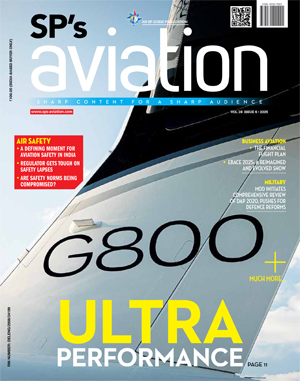INDIAN ARMED FORCES CHIEFS ON OUR RELENTLESS AND FOCUSED PUBLISHING EFFORTS

The insightful articles, inspiring narrations and analytical perspectives presented by the Editorial Team, establish an alluring connect with the reader. My compliments and best wishes to SP Guide Publications.

"Over the past 60 years, the growth of SP Guide Publications has mirrored the rising stature of Indian Navy. Its well-researched and informative magazines on Defence and Aerospace sector have served to shape an educated opinion of our military personnel, policy makers and the public alike. I wish SP's Publication team continued success, fair winds and following seas in all future endeavour!"

Since, its inception in 1964, SP Guide Publications has consistently demonstrated commitment to high-quality journalism in the aerospace and defence sectors, earning a well-deserved reputation as Asia's largest media house in this domain. I wish SP Guide Publications continued success in its pursuit of excellence.
- The layered Air Defence systems that worked superbly, the key element of Operation Sindoor
- Operation Sindoor | Day 2 DGMOs Briefing
- Operation Sindoor: Resolute yet Restrained
- India's Operation Sindoor Sends a Clear Message to Terror and the World – ‘ZERO TOLERANCE’
- Japan and India set forth a defence cooperation consultancy framework, talks on tank and jet engines
Survival in Doubt

Air India’s cumulative losses have reached staggering proportions. While the present crisis appears to be over, in the absence of proper accountability, there is no hope of revival or survival.
The 58-day strike by over 400 pilots of Air India who are members of the Indian Pilots’ Guild (IPG), was called off on Tuesday July 3 only after intervention by the Delhi High Court. Earlier, the Court had suggested that the parties involved explore possibilities of an amicable out-of-court settlement. The Court also advised the management of the airline to adopt a “parental attitude” towards the pilots. The other faction in Air India is the domestic segment consisting of pilots of erstwhile Indian Airlines represented by the Indian Commercial Pilots’ Association (ICPA).
The reason that had apparently triggered the strike by IPG this time was a decision by the management to include members of the ICPA for training on the Boeing 787 Dreamliner to be inducted in the near future. The IPG believes that as international operations have largely been their prerogative, members of ICPA ought not to be included for training on the Dreamliner. Apart from the turf war, pilots of the IPG are apprehensive that inclusion of pilots from ICPA will impinge on their career progression and promotion prospects.
The latest confrontation between the management and the IPG was a clear manifestation of the utter failure of the policy of the Ministry of Civil Aviation (MoCA) enunciated in 2007 to merge the two national carriers. In the stalemate, the services of over 100 pilots had been terminated and 200 of the remaining 300 were also threatened with precipitate action.
During the nearly two months that the situation was adrift, at no time was there any evidence on the part of the management of a clear plan of action to break the deadlock. While the government is usually prepared to negotiate even with the terrorists, no effort was made to initiate dialogue with the striking pilots to resolve issues. Pilots were only too willing to talk but tragically, the management was “missing in action”. And all this while the management had been claiming near normalcy with international operations. How this was possible with 15 of the 20 Boeing 777 aircraft grounded, defies logic. The management was not only misleading the nation, it also appeared totally unconcerned about the deleterious financial implications of the impasse. Accountability has never been a virtue with Air India in any case. Factually, international operations remained severely disrupted. Executive pilots deployed to operate international flights complained of being overstretched and under severe stress, a situation not at all conducive to air safety. Their sympathies undoubtedly lay with the striking faction of pilots as is evident from their communication with the management to this effect. Besides, 22 of the 120 executive pilots reported sick on June 19. All this while, Air India continued to lose money at a phenomenal rate and with the financial plight of the airline worsening on account of the rapidly rising burden of cumulative losses, the airline was fast approaching a point beyond redemption.
While in the recent episode, strike by the IPG had been declared illegal and the conduct of pilots was regarded as reprehensible, the management did not cover itself with glory either. The IPG had its own litany of complaints such as underpayment or non-payment of emoluments on time, discriminatory policies biased unduly in favour of the ICPA in respect of pay and promotions, denial of equal opportunity to members of the IPG, etc.





